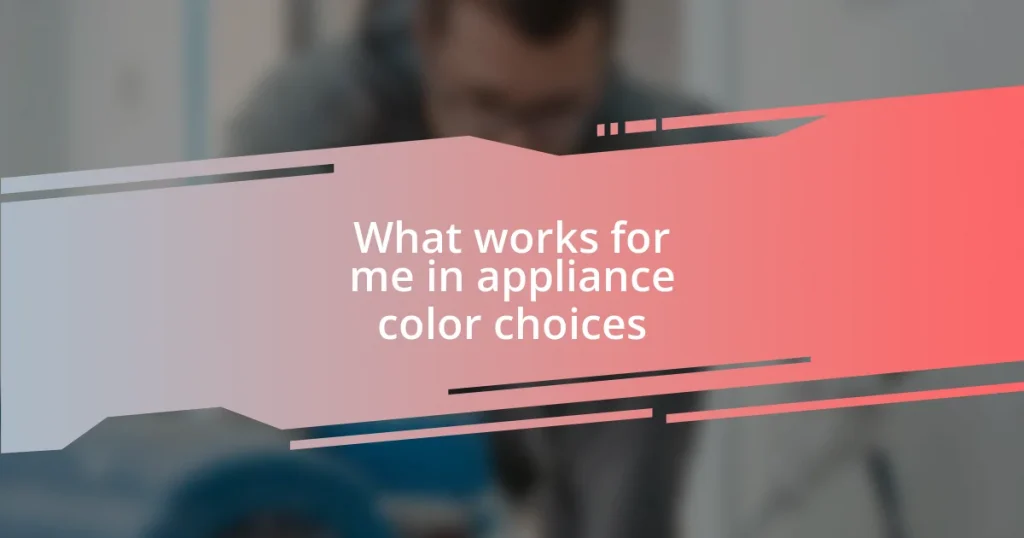Key takeaways:
- Wearable health technology provides real-time data that enhances awareness and lifestyle changes, such as improved hydration and sleep quality.
- Choosing the right wearable device involves assessing purpose, compatibility, battery life, customization, and comfort for better long-term use.
- Future advancements in wearable tech could lead to predictive health monitoring and seamless integration with smart devices for enhanced health management.

Introduction to wearable health tech
Wearable health tech has transformed the way we monitor our well-being and engage with our health. I still remember the first time I strapped on my fitness tracker; it felt like carrying a tiny health coach on my wrist, always reminding me to stand up and move. Can you imagine having such immediate feedback on your daily activity right at your fingertips?
These devices, from smartwatches to heart rate monitors, enable us to gather data about our physical condition in real-time. When I started using a sleep tracker, I was shocked to realize how poorly I was sleeping, despite feeling like I was resting well. This revelation opened my eyes to the importance of quality sleep—a topic I had previously brushed off casually.
Beyond just tracking steps or heart rates, wearable technology can provide insights that affect our lifestyle choices and overall health outcomes. Have you ever thought about how a simple data point can change your perspective? I have seen firsthand how monitoring my hydration levels through a smart water bottle made me more conscious of staying hydrated. That small change made a big difference in my energy levels and overall well-being.

Choosing the right wearable devices
Selecting the right wearable device can feel overwhelming given the myriad options available. I recall spending hours researching features to find a device that matched my health goals. It’s essential to consider what you truly need, whether it’s detailed heart rate monitoring for workouts or sleep tracking to gauge restfulness. Understanding your priorities will guide you towards a device that fits seamlessly into your lifestyle.
Here are some key factors to consider when choosing a wearable device:
- Purpose: Are you focusing on fitness tracking, sleep monitoring, or overall health?
- Compatibility: Does it sync well with your smartphone or other devices?
- Battery Life: How often will you need to charge it?
- Customization: Can you tailor settings and notifications to suit your preferences?
- Comfort: Does the device feel good on your wrist or body for all-day wear?
I remember the moment I realized how vital comfort was; I initially chose a stylish option that I ended up taking off due to discomfort. It taught me that function should always come before aesthetics. Make sure to test your options when possible, as the perfect device is one you’ll want to wear all the time.

My personal experiences with wearables
The first time I used a fitness tracker, it was more than just a gadget to me; it turned into a personal motivator. I remember being surprised by the step count at the end of my day; it pushed me to aim for that elusive 10,000 steps regularly. I found myself taking longer routes just to hit my goal, which pleasantly became a routine. Have you ever felt that small initial push from a wearable that turned into a lasting habit? It certainly transformed my approach to daily activity!
I also had an eye-opening experience with a heart rate monitor during one of my intense workout sessions. The first time I saw my heart rate spike, it was a wake-up call. I realized I needed to listen to my body better. I learned that pushing through discomfort isn’t always the answer, especially when it comes to health. Now, I use the readings to pace myself and prevent burnout, which let me enjoy the journey of fitness more.
Looking at my journey with a sleep tracker, I felt a mix of emotions. Initially, I was hesitant to confront the reality of my sleep habits. However, seeing the data directly on my screen—night after night—helped realize how crucial restful sleep was for my overall well-being. Tracking my sleep quality led me to actively incorporate relaxation techniques into my evening routine. This awareness ultimately changed my evening habits for the better. I often find myself reflecting on how much these small changes have impacted my daily energy levels.
| Device | Experience |
|---|---|
| Fitness Tracker | Motivated me to walk more and set daily goals |
| Heart Rate Monitor | Helped me understand my workout limits better |
| Sleep Tracker | Revealed the need for better sleep habits |

Benefits of using health tech
Using health tech has transformed the way I approach my overall wellness. One striking benefit I’ve experienced is how these devices offer immediate feedback. For instance, during my runs, seeing my pace in real-time isn’t just motivating; it helps me adjust my performance on the fly. Isn’t it fascinating how data can empower us to reach our potential?
Another advantage is the sense of accountability that wearable tech provides. I once joined a virtual challenge with friends using our fitness trackers, and I can honestly say, it added a whole new level of excitement to my routine. Having that external source of motivation pushed me to not only meet my goals but to surpass them. Have you ever been inspired by friendly competition? It can be an incredibly effective way to stay committed to your health journey.
Beyond motivation and accountability, I’ve also found that these devices have significantly increased my health awareness. When I started tracking my hydration levels, it opened my eyes to just how often I was falling short. It felt liberating to have that knowledge; I started carrying a water bottle everywhere. It’s incredible how something as simple as monitoring water intake can lead to such positive lifestyle changes. What small adjustments could you make today based on what you observe?

Challenges I faced with wearables
When I first started using wearables, I quickly discovered that technology isn’t flawless. I often experienced issues with syncing my device to my phone, leaving me frustrated when I couldn’t track my workouts in real-time. Have you ever felt the sinking disappointment of missing out on displaying your hard work? It took me a while to realize that sometimes a simple restart or update could fix the problem, but the initial hiccups were definitely discouraging.
Another challenge I’ve faced is the wearables’ comfort level. While I love the data they provide, I often found myself adjusting my fitness tracker during long workouts. It could become irritating, especially when that small distraction disrupted my focus. Honestly, have you ever had to choose between comfort and functionality? Finding a balance can be tricky, but I eventually learned to shop for devices designed with comfort in mind, which made a significant difference.
Then there’s the matter of data overload. Initially, I was thrilled to receive all that information, but it soon became overwhelming. At times, I found myself questioning what all those stats really meant for my health. Was I truly making progress, or was I simply fixating on numbers? It’s a conundrum many of us face with these gadgets. Thankfully, I started focusing on a few key metrics that resonated with my goals, allowing me to regain clarity and make the most of my wearable’s insights.

Improving health with wearable tech
I’ve found that improving my health with wearable technology has been a game changer, not just for tracking, but for truly engaging with my wellness. One time, after analyzing my sleep patterns with my smartwatch, I realized I was getting less REM sleep than I thought. It hit me hard—sleep is so important! I made a conscious effort to wind down earlier in the evenings, and the results were remarkable. Have you ever taken a hard look at your sleep habits? Sometimes, the most enlightening insights can come from simply paying attention to our nightly patterns.
The way I manage stress has also evolved thanks to wearables. My device has a stress-monitoring feature that vibrates gently when my heart rate spikes during a busy day. I remember being in a particularly hectic meeting when my wrist buzzed, reminding me to take a breath. It felt like having a supportive friend nudging me to step back and refocus. How often do we ignore those small signs our body gives us? Listening to my body in this way has changed my approach to stressful situations.
Finally, I can’t help but appreciate how wearables facilitate better health conversations with my doctor. I recently shared my step count and activity logs from my device during a check-up, and it led to a meaningful discussion about my fitness habits. This transparency allowed my doctor to give tailored advice based on real data rather than just estimates. Have you experienced the benefit of data-informed conversations about your health? It’s empowering to take charge of our health narratives, and wearable tech has truly made that possible for me.

Future of wearable health technology
As I look toward the future of wearable health technology, I can’t help but feel a sense of excitement. Imagine a world where wearables not only track our vitals but also predict health issues before they arise. It’s almost like having a personal health assistant on your wrist. How far could we take preventative care if our devices could flag potential health concerns early on?
With developments in artificial intelligence, the ability of wearables to analyze complex data will only improve. There’s so much potential to create personalized health plans that adapt in real time. For instance, I envision wearables that can adjust workout recommendations based on my current stress levels or suggest nutrition changes based on my activity levels. Have you ever thought about how technology could fine-tune your workout regimen just for you? It feels like we’re on the brink of a health revolution.
Moreover, the integration of wearables with other smart devices might soon allow us to create a harmonious ecosystem for health management. Picture this: your wearable pairs seamlessly with your home devices, adjusting lighting for a better night’s sleep or even monitoring your air quality for optimal breathing. That’s not just convenience; it’s about taking a proactive stance on our health. Can you fathom the possibilities of synced health in addressing issues before they affect our lives?















